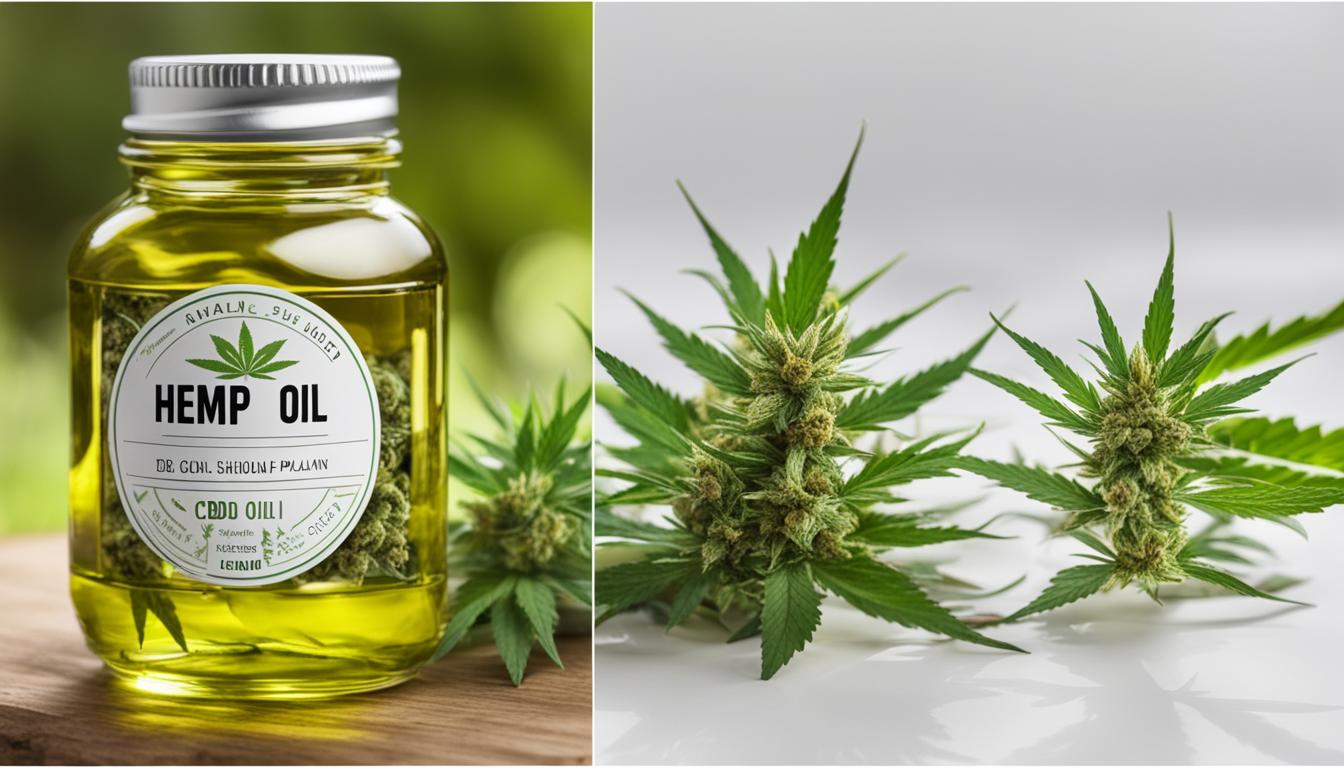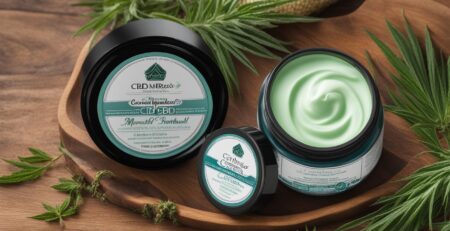Hemp Oil vs. CBD Oil: Clarifying the Differences Explained
Are you confused about the differences between hemp oil and CBD oil? You're not alone. With the increasing popularity of these oils, it's important to understand their unique properties and benefits. In this article, we will explore the distinctions between hemp oil and CBD oil, giving you the knowledge to make an informed decision about which one is right for you.
Key Takeaways:
- Hemp oil and CBD oil are different in terms of composition and uses.
- Hemp oil is primarily used in skincare products and has potential health benefits.
- CBD oil is known for its potential therapeutic effects, such as pain relief and anxiety management.
- Consider your specific needs and consult with a healthcare professional when choosing between the two.
- Ensure that you are purchasing high-quality CBD oil from reputable brands.
Understanding Hemp Seed Oil
Hemp seed oil, also known as hempseed oil or cannabis sativa seed oil, is extracted from the seeds of the hemp plant. It is rich in nutrients, including essential fatty acids, vitamins, and minerals. Hemp seed oil is often used in skincare products and has potential health benefits such as improving cardiovascular health and supporting brain function.
Here are some key points to know about hemp seed oil:
- Hemp seed oil is derived from the seeds of the hemp plant, not the flowers, leaves, or stems. This means it does not contain significant amounts of CBD or other cannabinoids.
- It is a natural source of essential fatty acids, including omega-3 and omega-6, which are beneficial for overall health and wellbeing.
- Hemp seed oil is commonly used in skincare products due to its moisturizing and nourishing properties. It can help hydrate the skin, reduce inflammation, and improve the appearance of fine lines and wrinkles.
- When consumed orally, hemp seed oil may have potential cardiovascular benefits. It may help reduce cholesterol levels, regulate blood pressure, and support heart health.
In summary, hemp seed oil is a nutrient-rich oil that is commonly used in skincare products and may have potential health benefits when consumed orally. It is important to note that hemp seed oil does not contain significant amounts of CBD and is distinct from CBD oil.
The Benefits of Hemp Seed Oil
Hemp seed oil offers several benefits that make it a popular choice in skincare and health products. Here are some of the key benefits:
- Moisturizes and nourishes the skin: Hemp seed oil is rich in fatty acids, which help maintain the skin's natural barrier and prevent moisture loss. It can deeply hydrate the skin, leaving it soft and supple.
- Reduces inflammation: The omega-3 and omega-6 fatty acids found in hemp seed oil have anti-inflammatory properties. This can help soothe and calm irritated skin, reducing redness and inflammation.
- Improves skin appearance: Hemp seed oil is packed with vitamins and antioxidants that promote healthy skin. It can help improve the appearance of fine lines, wrinkles, and uneven skin tone.
- Supports overall health: Consuming hemp seed oil can provide essential nutrients, such as omega-3 fatty acids and vitamin E, which are beneficial for heart health, brain function, and immune system support.
With its nourishing properties and potential health benefits, hemp seed oil is a versatile ingredient to incorporate into your skincare routine and daily diet.
Exploring CBD Oil
CBD oil, derived from the flowers, leaves, and stems of hemp and cannabis plants, is gaining popularity for its potential therapeutic effects. It contains cannabidiol (CBD) and other beneficial compounds. CBD oil has been studied for its ability to reduce pain and inflammation, manage anxiety and stress, and promote better sleep. It is available in various forms such as tinctures, topicals, and capsules.
One of the key benefits of CBD oil is its potential as a natural remedy for pain relief. It has been found to interact with the endocannabinoid system in the body, which plays a role in regulating pain. CBD oil may help reduce chronic pain by reducing inflammation and influencing neurotransmitter activity.
In addition to its pain-relieving properties, CBD oil has shown promise in managing anxiety and stress. Studies have suggested that CBD may help regulate the release of cortisol, a stress hormone, and promote a sense of calm and relaxation. CBD oil may also have potential benefits for individuals with sleep disorders, as it has been found to improve sleep quality and promote healthy sleep patterns.
It is important to note that while CBD oil has shown potential in these areas, further research is still needed to fully understand its efficacy and determine optimal dosages. It is also crucial to choose a high-quality CBD oil from reputable sources to ensure safety and effectiveness. Consulting with a healthcare professional is recommended for those considering the use of CBD oil for specific health concerns.

The Potential Benefits of CBD Oil:
- Reduces pain and inflammation
- Manages anxiety and stress
- Promotes better sleep
“CBD oil may help reduce chronic pain by reducing inflammation and influencing neurotransmitter activity.”
Differentiating Hemp Oil and CBD Oil
When it comes to hemp oil and CBD oil, it's important to understand the key differences between these two popular oils. While they are both derived from the cannabis plant, they have distinct compositions and uses.
In terms of composition, hemp oil is extracted from the seeds of the hemp plant. It is primarily composed of fatty acids, vitamins, and minerals. On the other hand, CBD oil is derived from the flowers, leaves, and stems of hemp and cannabis plants, and it contains cannabidiol (CBD) as the main active ingredient.
Another important distinction is their respective uses. Hemp oil is often used in skincare products due to its nourishing and moisturizing properties. It has potential benefits for the skin and is rich in essential fatty acids. CBD oil, on the other hand, is known for its potential therapeutic effects. It has gained popularity for its ability to reduce pain and inflammation, manage anxiety and stress, and promote better sleep.
In summary, while hemp oil and CBD oil share the same plant source, their compositions and uses set them apart. Hemp oil is primarily used in skincare products and has potential health benefits when consumed orally. CBD oil, on the other hand, is recognized for its potential therapeutic effects and is commonly used for pain relief, anxiety management, and sleep-related issues.
Note: The table below provides a visual comparison of the similarities and differences between hemp oil and CBD oil.
| Hemp Oil | CBD Oil | |
|---|---|---|
| Composition | Primarily fatty acids, vitamins, and minerals | Contains cannabidiol (CBD) as the main active ingredient |
| Uses | Skincare products, potential oral health benefits | Pain relief, anxiety management, sleep support |
It's essential to understand these distinctions in order to choose the oil that best suits your needs. Whether you're looking for skincare benefits or potential therapeutic effects, knowing the differences between hemp oil and CBD oil will help you make an informed decision.
Uses and Benefits of Hemp Oil
Hemp oil has a wide range of uses and potential benefits. It is a versatile product that can be incorporated into various aspects of your daily routine. Let's explore some of the key uses and benefits of hemp oil:
Skincare:
Hemp oil is often used in skincare products due to its nourishing and moisturizing properties. It can help hydrate and soothe the skin, making it a valuable ingredient in creams, lotions, and serums. The fatty acids present in hemp oil can also help improve skin elasticity and promote a youthful appearance.
Cardiovascular Health:
Consuming hemp oil orally may have potential benefits for cardiovascular health. Hemp oil is rich in omega-3 and omega-6 fatty acids, which are known to support heart health by reducing inflammation and promoting healthy blood flow. Incorporating hemp oil into your diet can be a beneficial addition to maintaining a healthy cardiovascular system.
Nutritional Supplement:
Hemp oil is a nutritious supplement that can provide essential fatty acids and amino acids to support overall health and well-being. It is a source of omega-3 and omega-6 fatty acids, which are important for brain function, heart health, and reducing inflammation in the body. Adding hemp oil to your daily routine can help ensure you are getting the nutrients your body needs.
In conclusion, hemp oil offers a range of potential uses and benefits, from skincare to cardiovascular health and nutritional supplementation. Its versatile nature makes it a valuable addition to your daily routine. Whether you incorporate it into your skincare regimen or consume it for its nutritional properties, hemp oil can be a beneficial and natural choice for promoting overall well-being.
Uses and Benefits of CBD Oil
CBD oil offers a wide range of potential uses and benefits. Its versatility makes it a popular choice for many individuals seeking natural remedies. Here are some of the key uses and potential therapeutic effects of CBD oil:
Pain Relief
CBD oil has been studied for its analgesic properties, making it a potential option for individuals seeking pain relief. It may help reduce discomfort associated with conditions such as arthritis, multiple sclerosis, and chronic pain. CBD oil interacts with the endocannabinoid system in the body, which plays a role in regulating pain sensation.
Stress and Anxiety Management
Many people turn to CBD oil as a natural alternative for managing stress and anxiety. It may help promote a sense of calm and relaxation by interacting with receptors in the brain responsible for regulating mood and emotions. Research suggests that CBD oil may be effective in reducing anxiety symptoms and improving overall well-being.
Improved Sleep Quality
If you struggle with sleep issues, CBD oil may offer potential benefits. It has been found to have a calming effect, which may help individuals fall asleep faster and experience a more restful night's sleep. CBD oil can also alleviate symptoms of sleep disorders such as insomnia, making it a promising option for those seeking natural sleep aids.
Skincare
In addition to its internal uses, CBD oil has gained popularity in the skincare industry. Its anti-inflammatory and antioxidant properties make it suitable for treating various skin conditions such as acne, eczema, and psoriasis. CBD oil can help reduce redness, irritation, and promote a healthy complexion when applied topically.
In summary, CBD oil offers a wide range of potential uses and benefits. It can provide relief from pain, help manage stress and anxiety, improve sleep quality, and promote healthier skin. However, it is important to note that further research is needed to fully understand the efficacy and long-term effects of CBD oil. Consulting with a healthcare professional is recommended before incorporating CBD oil into your wellness routine.
The Differences in Composition
When it comes to the composition of hemp oil and CBD oil, there are distinct differences that set them apart. Hemp oil is primarily made up of fatty acids, vitamins, and minerals, which contribute to its nutritional value. On the other hand, CBD oil contains cannabidiol (CBD) as the main active ingredient, along with other beneficial compounds found in the flowers, leaves, and stems of hemp and cannabis plants.
One key difference between hemp oil and CBD oil is the CBD content. Hemp oil does not contain significant amounts of CBD, while CBD oil can vary in CBD concentration depending on the extraction method used. This difference in CBD content is what makes CBD oil more suitable for those seeking the potential therapeutic effects of CBD, such as pain relief, anxiety management, and improved sleep.
Another important distinction is the THC content. THC is the psychoactive compound found in cannabis that produces a “high” sensation. CBD oil derived from hemp plants must contain less than 0.3% THC to be legal. On the other hand, hemp oil does not contain any significant levels of THC, making it non-psychoactive and safe for consumption.
| Hemp Oil | CBD Oil | |
|---|---|---|
| Composition | Fatty acids, vitamins, minerals | Cannabidiol (CBD), other beneficial compounds |
| CBD Content | Does not contain significant amounts of CBD | Varies in CBD concentration |
| THC Content | Does not contain significant levels of THC | Must contain less than 0.3% THC |
Overall, understanding the differences in composition between hemp oil and CBD oil is essential in choosing the right product for your needs. Whether you're looking for nutritional benefits or potential therapeutic effects, considering the composition and CBD content will guide you in making an informed decision.
Choosing the Right Oil for Your Needs
When it comes to choosing between hemp oil and CBD oil, it's important to consider your specific needs and desired effects. Both oils have their unique properties and benefits, so understanding their differences can help you make an informed decision.
If you are looking for a nutrient-rich oil with potential skincare benefits, hemp oil may be the right choice for you. It is often used in skincare products due to its nourishing and moisturizing properties. Additionally, hemp oil is rich in essential fatty acids and amino acids, making it a valuable addition to a balanced diet.
On the other hand, if you are seeking the potential therapeutic effects of CBD, such as pain relief or anxiety management, CBD oil would be more suitable. CBD oil has gained popularity for its potential benefits in reducing pain and inflammation, managing anxiety and stress, and promoting better sleep.
It is important to consult with a healthcare professional to determine which oil is best for your needs. They can provide personalized guidance based on your specific goals and health conditions. Additionally, consider starting with a lower dosage and gradually increasing it to find the optimal amount for you.

Ensuring Quality and Safety
When it comes to purchasing CBD oil, ensuring quality and safety is of utmost importance. With so many products on the market, it can be challenging to differentiate between real CBD oil and inferior alternatives. To ensure you are getting a high-quality product that delivers the desired benefits, here are a few key factors to consider.
Third-Party Lab Testing
One of the most reliable ways to verify the quality of CBD oil is through third-party lab testing. Reputable brands will provide lab reports from independent testing facilities, which confirm the potency, purity, and safety of their products. These reports show the exact composition of the oil, including the CBD and THC content, as well as the presence of any contaminants. By reviewing these lab reports, you can have peace of mind knowing that the CBD oil you are purchasing is genuine and meets the highest quality standards.
Source of the CBD Oil
The source of the CBD oil is another crucial factor to consider. Look for brands that source their CBD from organic hemp plants. Organic cultivation ensures that the hemp is grown without the use of pesticides, herbicides, or other harmful chemicals. CBD oil derived from organically grown hemp is more likely to be free from contaminants and provide a safer and more effective product.
Clear Labeling
Transparent and clear labeling is essential when selecting CBD oil. Look for products that clearly state the CBD content per serving, as well as any additional ingredients. A reputable brand will provide detailed information about the extraction method used, the origin of the hemp, and the recommended dosage. Clear labeling allows you to make an informed decision and ensures that you are purchasing a product that aligns with your needs and preferences.
By taking these factors into account and conducting thorough research, you can find real CBD oil that is safe, effective, and delivers the desired benefits. Remember, always consult with a healthcare professional before starting any CBD regimen to ensure it is suitable for your individual needs.
Conclusion
In summary, hemp oil and CBD oil are distinct products with different compositions and applications. Hemp oil, derived from the seeds of the hemp plant, contains essential fatty acids, vitamins, and minerals. It is commonly used in skincare products and has potential health benefits when consumed orally. On the other hand, CBD oil is extracted from the flowers, leaves, and stems of hemp and cannabis plants, and it contains cannabidiol (CBD) as the primary active ingredient.
CBD oil has gained popularity for its potential therapeutic effects, including pain management, anxiety reduction, and improved sleep quality. It is available in various forms such as tinctures, topicals, and capsules. When deciding between hemp oil and CBD oil, it is essential to consider your specific needs and goals.
If you're looking for a nutrient-rich oil with potential skincare benefits, hemp oil may be the right choice. However, if you're seeking the potential therapeutic effects of CBD, such as pain relief or anxiety management, CBD oil would be more suitable. It's always advisable to consult with a healthcare professional to make an informed decision based on your individual circumstances.
FAQ
What is the difference between hemp oil and CBD oil?
Hemp oil is derived from the seeds of the hemp plant and does not contain significant amounts of CBD. CBD oil, on the other hand, is extracted from the flowers, leaves, and stems of hemp and cannabis plants and contains CBD as the main active ingredient.
What are the uses and benefits of hemp oil?
Hemp oil has various uses and potential benefits. It is often used in skincare products, thanks to its nourishing and moisturizing properties. It can also be consumed orally and has been associated with improving cardiovascular health and reducing inflammation in the body. Hemp oil is rich in essential fatty acids and amino acids, making it a valuable addition to a balanced diet.
What are the uses and benefits of CBD oil?
CBD oil has a wide range of potential uses and benefits. It has been studied for its effectiveness in reducing pain, managing anxiety and stress, improving sleep quality, and even helping with substance abuse disorders. Additionally, CBD oil has antioxidant and antimicrobial properties, making it suitable for skincare products. However, more research is needed to fully understand its efficacy in treating various medical conditions.
How do the compositions of hemp oil and CBD oil differ?
Hemp oil is primarily made up of fatty acids, vitamins, and minerals, while CBD oil contains cannabidiol (CBD) as the main active ingredient. Hemp oil does not contain significant amounts of CBD, whereas CBD oil can vary in CBD concentration depending on the extraction method used.
How do I choose between hemp oil and CBD oil?
The choice between hemp oil and CBD oil depends on your specific needs and desired effects. If you are looking for a nutrient-rich oil with potential skincare benefits, hemp oil may be the right choice. On the other hand, if you are seeking the potential therapeutic effects of CBD, such as pain relief or anxiety management, CBD oil would be more suitable. It is important to consider your goals and consult with a healthcare professional to determine which oil is best for you.
How can I ensure I am getting a high-quality CBD oil?
When purchasing CBD oil, it is crucial to ensure that you are getting a high-quality product. Look for brands that provide third-party lab testing, which confirms the potency, purity, and safety of the oil. Additionally, seek out CBD oil that is sourced from organic hemp and has clear labeling. This will help you avoid misleading or mislabeled products and ensure that you are getting the real CBD oil with the desired benefits.
Source Links
- https://www.cornbreadhemp.com/blogs/learn/hemp-oil-vs-cbd-oil
- https://www.nuggmd.com/blog/hemp-oil-vs-cbd-whats-the-difference
- https://www.wellandgood.com/hemp-oil-vs-cbd-oil/










Leave a Reply